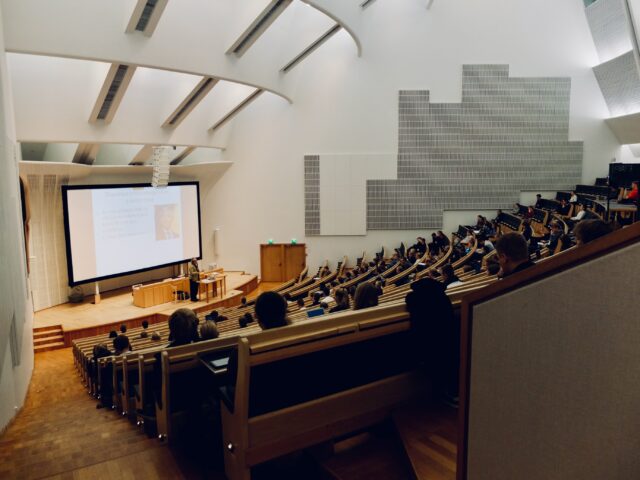In recognition of Black History Month, postsecondary institutions across Canada are holding dedicated events and activities. Mount Saint Vincent University hosted an African Heritage Month Opening Ceremony with performances and African art and drumming. McMaster launched the month by sharing community and campus events such as the City of Hamilton’s Black History Month Launch and inviting Black students to create art to decorate the doors of the Wellness Centre. The University of Toronto’s International Education Centre will be featuring social media posts highlighting Black Canadians and hosting an event during which Black students will share their stories. The University of Winnipeg’s Student Association and the Canadian Federation of Students Manitoba have partnered to host a celebration of Black history and culture, while the University of Manitoba Black Alliance is hosting a virtual panel discussion on the Scarborough Charter. Lethbridge College will be celebrating the month with a cultural attire day, library displays, meal kits, and more.

Top Ten News
February 1, 2023
Cape Breton University and Dalhousie University have announced that they will be collaborating on the development of a joint medical campus. In a recent province address, Nova Scotia Premier Tim Houston announced that the medical school is expected to begin taking students in 2025, if not earlier. The medical school will be housed in provincially owned buildings that were used by Nova Scotia Community College, which in turn will be moving to downtown Sydney, NS. The buildings will house the school of nursing, school of social work, and a 10,000-person clinic that will provide services to the community.
Brandon University’s Board of Governors has voted to adopt a new Violence Prevention Policy. The policy change is being made to address the length of the Respectful Environmental Policy, which addressed issues related to harassment, discrimination, sexual violence, and workplace violence. The former policy could reportedly be difficult for those in crisis to navigate because of its length and complexity. A dedicated policy now defines and addresses workplace violence and outlines how it can apply to violent incidents that occur in the workplace, as well as those that take place outside of normal working hours or off-site. BrandonU is also developing an online training program on the new framework for employees.
Lakehead University has announced that its Faculty of Engineering will be offering a Bachelor of Mechatronics Engineering (BEng). The Mechatronics Engineering degree will have sustainability and co-op at its core and will focus on preparing students to design intelligent machines that will support the United Nations’ Sustainable Development Goals. During their studies, students will also learn about business, law, and public safety. “The technological revolution we are experiencing is increasingly merging traditional disciplines of engineering, and new ones are emerging, including Mechatronics Engineering,” said Lakeland Dean of Engineering Janusz Kozinski. The program will be offered at Lakehead’s Thunder Bay campus and is scheduled to kick off in Fall 2023.
University of Lethbridge has indicated that a talk set to be held by controversial former Mount Royal University professor Frances Widdowson will not be permitted space on campus. CBC reports that over 2,500 people signed petitions against Widdowson’s planned talk at the university. The talk, titled “How ‘Woke-ism’ Threatens Academic Freedom,” was not organized by the university itself, but was scheduled to be held on campus today. The university cancelled the lecture after seeking guidance from internal and external communities. “This input confirmed that assertions that seek to minimize the significant and detrimental impact of Canada’s residential school system are harmful,” Mahon said in a statement. “To ensure our community is safe, in the context of this planned lecture, the University will not provide space for this public lecture to occur on campus.”
Colleges Ontario recently released its key performance indicators, which list the graduation rate, graduate employment rate, graduate satisfaction rate, and employer satisfaction rate for 2020-21 for each public college in Ontario. The average provincial graduation rate was 65.2%, and the colleges with the highest graduation rates were Collège Boréal (75.2%), St Clair College (70.6%), and St Lawrence College (68.9%). The average graduate employment rate was 83.4%, while the colleges with the highest employment rates were Loyalist College (92.3%), Confederation College (91.1%), and SLC (91.1%). Several institutions received a 100% satisfaction rate from employers who hired their graduates. In interviews with CTV News and the Intelligencer, several college leaders expressed their pride in how their graduates and institutions performed during the pandemic.
In a recent editorial for Inside Higher Ed, Rachel Elliott Rigolino discusses how the appearance of AI writing programs like ChatGPT should prompt writing instructors to teach their students how to be good editors. Rigolino writes that students need to learn to be critical readers who can check texts for accuracy and pay attention to detail. While academic integrity should be discussed with students, instructors should encourage students to critically examine the use of AI writing technologies by demonstrating the limitations of these technologies. “[The role of AI-generated writing is] likely already a settled matter in the business world,” writes Rigolino. “This means educators would do well to find a way not only to live with the technology but also to incorporate it into our pedagogies.”
Cégep de Jonquière announced that it will be reviewing and updating five programs this fall in areas such as the natural sciences, education, and computer science. The programs were selected by ministerial request and/or by the Cégep in response to labour market changes and instructor feedback. Some of the programs will be realigned with the skills and knowledge areas necessary for today’s labour market, while others will gain more concrete courses and programs.
A recent Nature article by Rachel Crowell discusses the recent efforts to decolonize the field of mathematics. Crowell explains that math is one of the least diverse STEM disciplines and discusses some of the tactics used to decolonize it. Some mathematicians have linked culture to curriculum, which broadens the cultural scope of the curriculum while introducing students to examples from real life. Others, such as the African Institute for Mathematical Sciences, which has five locations across Africa, focus on breaking down geopolitical barriers and engaging more female students. Durham University in the United Kingdom, has initiated decolonization initiatives to create change and increase diversity within the curriculum, discussions, and references.
CEWIL Canada and Future NB have announced a new partnership to support New Brunswick students with experiential and work-integrated learning. The two will work together to establish experiential learning in NB’s K-12 and postsecondary education systems and prepare students to contribute to the province’s workforce. The partners will also share best practices and showcase innovative programs to support the education system’s development of future-ready students. Postsecondary institutions in the province will also have the opportunity to support international students as they transition to the workplace through Future NB International’s program. “This movement that engages institutions, industry and community alongside government serves as an aspirational goal for the higher education landscape,” said CEWIL Canada Executive Director Charlene Marion.
